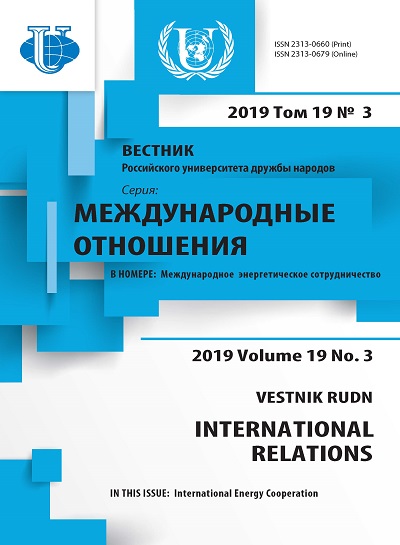An Assessment of Religion, Peace and Conflict in the Post 1991 of Ethiopia
- 作者: Antigegn G.K.1
-
隶属关系:
- Bahir Dar University
- 期: 卷 19, 编号 4 (2019): Islamic Factor in World Politics
- 页面: 607-614
- 栏目: THEMATIC DOSSIER
- URL: https://journals.rudn.ru/international-relations/article/view/22839
- DOI: https://doi.org/10.22363/2313-0660-2019-19-4-607-614
如何引用文章
全文:
详细
Religious violence has become increasingly relevant in political and academic discourses. Because of the revival of religions, the contemporary world cannot be understood without accounting for the role of religion and religious organizations in peace and conflict, including the case of Ethiopia. The purpose of this article is to examine the role of religion in peace and conflict in the post 1991 of Ethiopia. Methodologically, the paper employed qualitative research approach by relying on secondary sources of data. The findings of the research revealed that Ethiopia has many positive assets that have to be exploited fully and critically including the role of the Inter-Religious Council. The religious policies of the present Ethiopian government are remarkably different from any of the previous ones with regard to the measure of religious freedom they provide. Paradoxically, one may wonder why is it at this time, where religious freedom and equality of religion are guaranteed, we are witnessing increased tensions and violent religious conflicts in contemporary Ethiopia. Inter-religious relations in Ethiopia have been peaceful and tolerant for long period. However, the rise of inter-religious conflicts in recent decades is taking place. Generally, in contemporary Ethiopia religion is used both as an instrument for producing conflict in certain circumstances and as a powerful resource for peace and transformation of conflict in the society. On the whole, identifying the role of religion in conflict is a very complex task to accomplish, as there are multiple variables to be well-thought-out.
作者简介
Getahun Antigegn
Bahir Dar University
Email: getkumie@yahoo.com
Assistant Professor and Researcher, Department of Political Science and International Studies Bahir Dar, Ethiopia
参考
- Abbink, J. (1998). A Historical-Anthropological Approach to Islam in Ethiopia: Issues of Identity and Politics. Journal of African Cultural Studies, 11 (2), 109-124.
- Abbink, J. (2011). Religion in Public Spaces: Emerging Muslim-Christian Polemics in Ethiopia. African Affairs, 110 (439), 253-274.
- Abbink, J. (2014). Religious Freedom and the Political Order: The Ethiopian ‘Secular State’ and the Containment of Muslim Identity Politics. Journal of Eastern African Studies, 8 (3), 346-365.
- Ahmed, H. (1994). Islam and Islamic Discourse in Ethiopia (1973-1993). In: Marcus, H.G. (Eds.). New Trends in Ethiopian Studies. Vol. 1. Lawrenceville, N.J.: Red Sea Press. P. 775-801.
- Ahmed, H. (2006). Coexistence and/or Confrontation? Towards A Reappraisal of Christian-Muslim Encounter in Contemporary Ethiopia. Journal of Religion in Africa, 36 (1), 4-22.
- Appleby, R.S. (1999). The Ambivalence of the Sacred: Religion, Violence, and Reconciliation. Rowman & Littlefield Publishers.
- Boulding, E. (1986). Two Cultures of Religion as Obstacles to Peace. Zygon, 21 (4), 501-518.
- Dereje, F. (2012). The Transnational Politics of the Ethiopian Muslim diaspora. Ethnic and Racial Studies, 35 (11), 1893-1913.
- Endalew, L. (2014). Ethiopian Customary Dispute Resolution Mechanisms: Forms of Restorative Justice. African Journal on Conflict Resolution, 14 (1), 125-154.
- Erlich, H. (2010). Islam and Christianity in the Horn of Africa: Somalia, Ethiopia, Sudan. Lynne Rienner Publishers.
- Haustein, J. & Østebø, T. (2011). EPRDF’s Revolutionary Democracy and Religious Plurality: Islam and Christianity in PostDerg Ethiopia. Journal of Eastern African Studies, 5 (4), 755-772.
- Kabha, M. & Erlich, H. (2006). Al-Ahbash and Wahhabiyya: Interpretations of Islam. International Journal of Middle East Studies, 38 (4), 519-538.
- Karbo, T. (2013). Religion and Social Cohesion in Ethiopia. International Journal of Peace, 4 (3), 43-52.
- Kubai, A. & Tarekegn, A. (2008). Striving in Faith: Christians and Muslims in Africa. Life and peace institute, Uppsala, Sweden.
- Levine, D. N. (1974). Greater Ethiopia: the Evolution of a Multiethnic Society, Chicago: University of Chicago Press.
- Magesa, L. (2007). Contemporary Catholic Perspectives on Christian-Muslim Relations in Sub-Saharan Africa: The Case of Tanzania. Islam-Christian Muslim Relations, 18 (2), 165-173.
- Muhabie, M. (2015). The Root Causes of Conflicts in the Horn of Africa. American Journal of Applied Psychology, 4 (2), 28-34.
- Østebø, T. (2007). The Question of Becoming: Islamic Reform-Movements in Contemporary Ethiopia. CMI Working Paper.
- Østebø, T. (2013). Islam and State Relations in Ethiopia: From Containment to the Production of Governmental Islam. Journal of the American Academy of Religion, 8 (4), 1029-1060.
- Reychler, L. (1997). Religion and Conflict. International Journal of Peace Studies, 2, 16.
- Svensson, I. (2008). Divine Disputes? Exploring the Religious Dimensions of Armed Conflicts. Occasional paper, Life and Peace Institute, Uppsala, Sweden.
- Tarekegn, A. (2002). Religion and Culture of Violence. New Routes: A Journal of Peace Research and Action, 3-9. Life and Peace Institute, Uppsala, Sweden.








